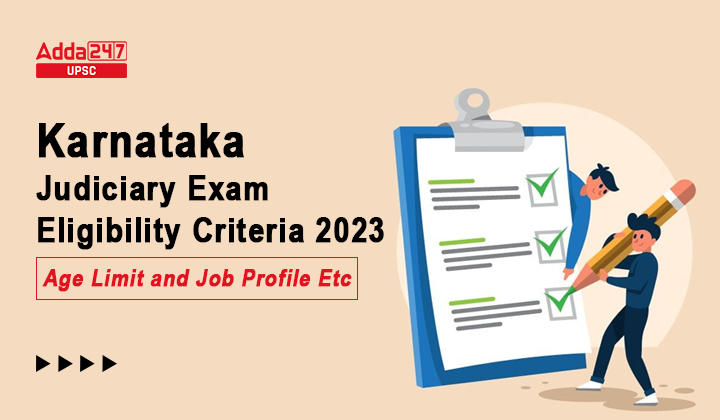Table of Contents
Karnataka Judiciary Exam Eligibility Criteria 2023: The Karnataka Judiciary Exam is a highly sought-after opportunity for individuals aspiring to join the judicial services in the state. To ensure a fair and efficient selection process, the Karnataka High Court sets specific eligibility criteria that candidates must meet in order to be eligible for the exam. These criteria encompass various aspects such as age limit, educational qualifications, and other essential requirements. In this article, we will delve into the Karnataka Judiciary Exam Eligibility Criteria, including the age limit, educational qualifications, and job profile of a judicial officer in Karnataka. By understanding these Karnataka Judiciary Exam Eligibility Criteria, aspiring candidates can better prepare themselves for a successful career in the judiciary.
Karnataka Judiciary Exam 2023 Overview
The Karnataka Judicial Services Examination is organized by the Karnataka State Judiciary to select civil judges for the state. This comprehensive exam consists of multiple stages and is open to law graduates who fulfill the eligibility criteria established by the Karnataka High Court. Below is a brief outline of the examination process for the Karnataka Judicial Services.
| Karnataka Judiciary Exam Overview |
|
| Events | Dates |
| Karnataka Judiciary Exam 2023 Notification | To be notified |
| Karnataka Judiciary 2023 application form release date | To be notified |
| Karnataka Judicial Services 2023 Last Date to fill out Application Form | To be notified |
| Karnataka Judicial Services Exam 2023 Release of Admit Card | To be notified |
| Karnataka Judicial Services 2023 Prelims Exam | To be notified |
| Karnataka Judiciary 2023 prelims results | To be notified |
| Karnataka Judiciary Exam 2023 Official website | https://karnatakajudiciary.kar.nic.in/ |
Karnataka Judicial Services Eligibility Criteria
There are certain Karnataka Judiciary eligibility criteria that candidates need to fulfill in order to be eligible for the exam. To apply for the exam, candidates must have completed a Bachelor of Laws (LLB) degree from a recognized university. They must also be enrolled as an advocate under the Advocates Act, 1961. Additionally, candidates must meet the prescribed age limit, which is usually between 25 to 35 years, with relaxation provided for reserved categories. It is important for candidates to carefully review and fulfill these Karnataka Judicial Services eligibility criteria before applying for the Karnataka Judiciary Exam to ensure their application is considered valid.
Karnataka Judiciary Age Limit
The age limit for candidates appearing for the Karnataka Judicial Services post through direct recruitment is set at 35 years. However, for the recruitment of In-Service candidates, the upper age limit is 40 years for general category employees. It is important to note that there are certain relaxations provided under specific circumstances. These relaxations may vary and are subject to the rules and regulations set by the Karnataka Judiciary.
| Criteria | Age Limit |
| Direct Recruitment |
|
| Recruitment of In-Service Candidates | 43 years for candidates belonging to SC/ ST categories, and 40 years in the case of general. |
Karnataka Judiciary Educational Qualifications
| Criteria | Educational Qualifications |
| Direct Recruitment |
|
| Recruitment of In-Service Candidates |
|
Karnataka Judicial Services Nationality
As per the official recruitment notification of the Karnataka High Court, candidates applying for the recruitment must be Indian citizens, as it is an essential Karnataka Judicial Services eligibility criteria for the selection process.
Karnataka Judiciary Experience Required
Candidates applying for the Karnataka Civil Judge recruitment do not need any prior job experience or specific job requirements. The eligibility criteria primarily focus on the candidate’s educational qualifications, as stated in the official Karnataka Civil Judge Eligibility criteria.
Karnataka Judiciary Job Profile
The Karnataka Judiciary job profile involves significant responsibilities and duties related to the administration of justice in the state. As a civil judge, their main role is to preside over civil cases, ensuring fair and impartial hearings, and delivering judgments based on the merits of the case and relevant laws. The Karnataka Judiciary is responsible for conducting proceedings, listening to arguments from both sides, examining evidence, and making legal determinations. They have the authority to interpret and apply the law, issue orders, and pass judgments.
Apart from presiding over civil cases, civil judges also handle various administrative tasks related to their court, such as case management, maintaining records, and ensuring the smooth functioning of the court proceedings. They may also be involved in alternative dispute resolution methods like mediation and settlement conferences to facilitate the resolution of disputes outside the courtroom. Karnataka Civil judges are expected to have a comprehensive understanding of civil laws, legal principles, and precedents. They must possess excellent analytical, research, and communication skills to effectively assess legal arguments, write clear and concise judgments, and communicate with lawyers, litigants, and court staff.
Overall, the Karnataka Judiciary Job Profile demands a high level of legal expertise, impartiality, and dedication to upholding justice and maintaining the integrity of the judicial system.
| Follow US |
|
| UPSC Govt Jobs UPSC Current Affairs UPSC Judiciary PCS Download Adda 247 App here to get the latest updates |



 TSPSC Group 1 Question Paper 2024, Downl...
TSPSC Group 1 Question Paper 2024, Downl...
 TSPSC Group 1 Answer key 2024 Out, Downl...
TSPSC Group 1 Answer key 2024 Out, Downl...
 UPSC Prelims 2024 Question Paper, Downlo...
UPSC Prelims 2024 Question Paper, Downlo...




